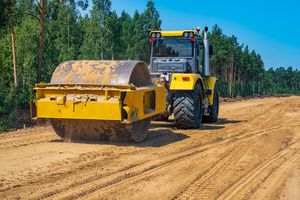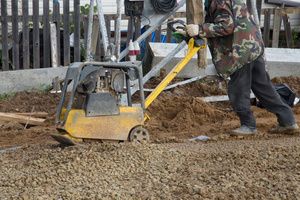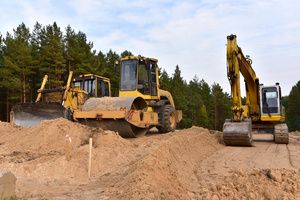Most construction and landscaping projects are built on a foundation. If the foundation fails, the entire project will be in jeopardy, which is why it’s essential to ensure that the compact dirt base is secure. When working with dirt, compaction is essential for creating a sturdy and safe base.
Why Must Soil Be Compacted?

Soil compaction densifies soil by reducing the amount of air, or void space, found between the particles of the soil. It essentially presses them together to reduce the amount of space between them, giving the soil a higher unit weight and decreasing the chances that whatever is constructed on top of it will settle.
Different types of soil require different approaches to ensure optimal compaction. For example, cohesive clay soils should be compacted with force, while sandy soil requires the use of vibratory soil compactors. Although gardeners can compact soil using hand tools, heavy compaction equipment is often used in construction sites.
Compacting Dirt on a Slope: Large Projects
Larger dirt compaction projects need to be carried out by professionals with the proper training and equipment to get the job done safely and effectively. Conventional soil compactor rollers do not perform well on slopes and may struggle to climb the gradient.
Instead, specialty equipment such as a slope compactor roller is needed. These are attachments that can go onto excavators or backhoe loaders. They consist of a vibratory roller that is vibrated through a shaft in conjunction with the operation of the carrier equipment’s hydraulic circuit.
These types of compactors are useful at construction sites where soil compaction is needed on slopes, such as roadside hills and canals. They can also be used in areas that cannot be accessed by conventional compactors.
While modern compactors are designed with features aimed at boosting their stability and increasing safety, there is always a risk for rollover accidents – particularly when working on inclines or embankments, which puts the operator at risk of serious injury. This is why it is crucial that the person carrying out this task is well-trained and the equipment is suitable for the task.
Only trained professionals can carry out this type of work, but there are some scenarios where you may be able to compact dirt on a slope on a smaller scale.
Compacting Dirt on a Slope: Smaller Projects

One common small-scale scenario in which it may be necessary to carry out some DIY compaction on a slope is in the construction of a retaining wall. While some people believe a retaining wall needs to be able to hold all of the weight of the soil that stands behind it, it really only needs to be able to support the soil that is in front of the slope of the failure plane. This is the naturally occurring slope found in an uneven yard. The angle of this slope causes soil placed on top of it to “fail” to remain in place thanks to gravity. Your retaining wall will keep this soil in place.
Soil compaction will help to direct the force that the soil’s weight and pressure generate downward.
For this task, you’ll need to use a plate compactor or tamping rammer. You’ll also need to decide how many layers you will need for the height of your retaining wall; a few layers of 3 to 4 inches should be suitable in many cases. Compact the material with a plate compactor, being sure to choose a heavy model for the best results.
Then, place a reinforcing grid on top to keep the material in place and repeat the same process for your second layer. The metal mesh in the reinforcing grid represses the fill and adds pressure to it so it will remain in place after compaction. This process should be continued until the full height of the wall is covered.
The best materials to use for compaction in this type of project are sandy or gravelly ones; avoid using topsoil as it will easily break down and settle, which will create a space where water can collect and eventually damage your wall.
Adding Soil to a Hill Slope
For smaller projects involving slopes, it may not be necessary to bring in specialized equipment. For example, if you have a sloped yard you wish to landscape, you can bring in soil to level it out carefully without the need for compaction equipment.
Measure the area that will need soil, multiplying the length times the width times the average depth you wish to place there in feet, and then divide by 27 to determine cubic yards.

Then, contact your local landscape supplier to arrange for a delivery of topsoil. Be sure to choose the screened variety as this will not contain rocks, debris or roots, making for an excellent growing medium.
To spread the soil, begin at the bottom of the area and dump it in by the wheelbarrow load in a line across the slope, working to build the lowest area up to your desired height. Add additional loads of soil until you have a level area to work with.
Next, you will want to rake your soil piles into a flat, smooth surface. At the top end of your filled area, drive a stake into the ground and tie a string around it. Then, attach a line level to the string and stretch it out to various points along your slope to identify any areas that are too high or low. Keep adding soil and raking it and checking it with the line level until you obtain a flat, even surface.
The surface of the filled area should have a slight downhill slope to make drainage easier; aim for an inch of drop for every 10 feet of distance.
Contact the Northern Virginia Soil Compaction Professionals
For professional soil compaction at residential and commercial sites, contact the soil compaction experts at Dirt Connections. We offer a range of dirt grading, site preparation, excavation and demolition services throughout the Northern Virginia area, along with fill dirt and high-quality soil delivery. Call us today to discuss your project.
Summary

Dirt Connections was started with one goal in mind: providing quality residential and commercial construction services to clients on time and on budget. Reach out for more information on how we can support your next project.
For your convenience our estimates are free and by appointment. Call 703-940-9949 for a free estimate today!



